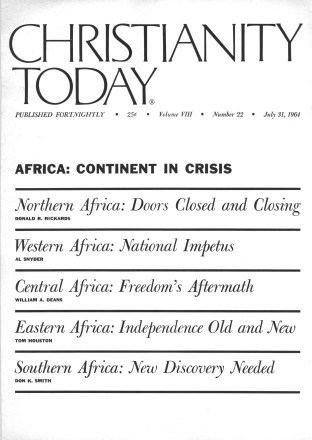Biblical criticism is a phenomenon that characterizes our century. The Church has been preoccupied with the problems posed by it for more than a hundred years, and there is no sign that we will be free of it in our lifetimes. One response to biblical criticism has been to try to prove that in this case and that case the Bible was right after all, that archaeological discoveries have established the historical accuracy of the Scriptures. But this apologetic response to biblical criticism has not set restless hearts at peace.
In Protestant as in Catholic circles, however, scholarly energy has not been spent merely in rear-action apologetics; biblical students have been earnestly trying to get into the purpose and the nature of Scripture’s authority. In times like these, times that I insist are not without hopeful perspective for the Church, we must not be tempted to be simplistic in our answer to biblical criticism; we will do well to avoid the notion that it is possible to confine dangers to scriptural authority to a single group.
We ought, of course, to be against all hard-headed vivisection of the Bible. But we ought also to be aware that forms of biblical criticism pop up in unexpected places. There is, in fact, a kind of biblical criticism that rears its head among those who confess that the Bible is the infallible Word of God. Herman Bavinck had a sharp eye for this kind of criticism. He talked about the hostility for the Word that rests in the heart and that can come alive in many forms. And to this he adds these remarkable words: “Hostility to the Scriptures does not appear only, nor even in its most treacherous form, in the scientific criticism to which the Scriptures are subject in our day. The Bible as the Word of God meets resistance and unbelief in every natural man. The days of dead orthodoxy manifested a basic unbelief in the Scriptures that was as powerful as that expressed in the historical and critical approach of our unbelieving century.”
There are striking sentences for us, since we hardly think of biblical criticism in connection with dead orthodoxy. We associate criticism with such men as Wellhausen and others who deny the divine authority of the Scriptures. But Bavinck is warning us against the sort of criticism that is really a form of “unbelief in the Bible” and that lives among those who are unconscious of it. The worst critics may be those who would rebel against being identified with Wellhausen or Bultmann. Dead orthodoxy and biblical criticism—strange but possible bedfellows!
This means that we are not clear of danger with a confession about the divine inspiration of the Bible. Confess this as we may, we may also be perilously involved in the worst kind of criticism of the Bible, and in fact not be subjecting ourselves to the authority of the Scriptures at all. Consider the Pharisees. They had enormous respect for the law of God. Consider Israel, who “pursued the righteousness which is based on law” (Rom. 9:31) but never succeeded in fulfilling it. There may be zeal for divine authority that ends with Paul in persecuting the Church (Phil. 3:6). No one gets clear of danger by accepting a formal definition of the Scriptures as the Word of God.
There is a simple and profound reason for this. The Scriptures are never a formal matter. When we deal with the Bible, we can approach it only in terms of its authoritative content. The Pharisees accepted and defended the law as of God—in contrast to the multitudes who did not know the law—but they ended by taking away the key to the knowledge of the law (Luke 11:52). Their respect for the divine inspiration of the law did not spare them the worst kind of apostasy. This is the danger to which Bavinck was alerting us.
Bavinck believed that criticism of the Scripture occurs among many who are ready to contend for the formal authority of the Bible. This is often a covert criticism, but a treacherous one for all that. Bavinck did not take lightly the dangers to faith in the biblical criticism of such as Wellhausen. But he did recognize the treachery of a criticism practiced by those who would not come near the more familiar and open higher criticism. Paul said of Israel, who believed in the divine authority of the “writings,” that they were unwilling to subject themselves to the righteousness of God. In the same manner, those who today protest most loudly their adherence to the divinity of every letter of the Bible also run the danger of a camouflaged criticism of the Bible. We must be extra careful that we do not make a formal cliché out of our confession regarding the authority of the Scriptures. There are many forms of Christian faith expressed among people who are mortal enemies of biblical criticism, forms which are in fact only weird caricatures of biblical faith.
We can say something meaningful to the biblical critics of our time only as we subject ourselves to the message of Scripture. And this is no kindergarten task. The terrible divisions of the Church testify to the challenge of genuine subjection to the one message of the Gospel. Each division appeals to the divine authority of the Bible for its claim to authenticity.
Bavinck is right when he tells us not to make too quick a distinction between those who do and those who do not subject themselves to Scripture’s authority. For real subjection to Scripture must become manifest and clear in what we do with its message. We are not finished with criticism when we have said a No to higher criticism. We shall often have to say No to ourselves. We shall often have to say No to our own insidious and tendentious criticism of the Bible.










